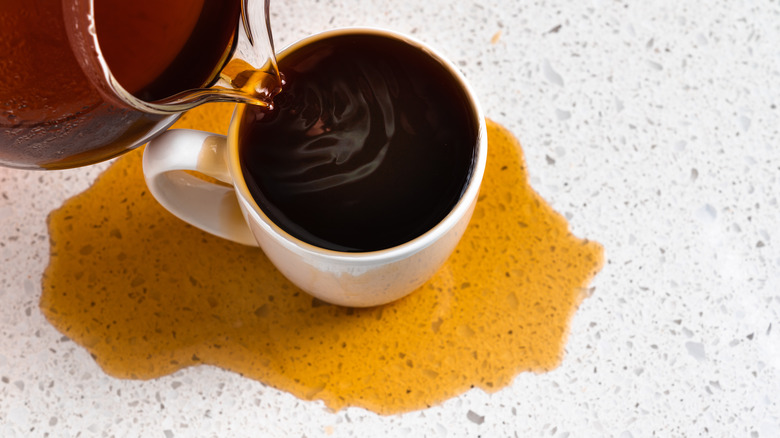You Should Cut Back On Caffeine If This Happens To You
Our busy lives have us leaning on caffeine perhaps a bit too often. Oftentimes, guzzling too much can be on purpose — hey, the coffee was right there and it was free! And other times, an overdose can happen without warning. After all, the substance is found in many foods and drinks that have become intertwined with daily social interactions and societal traditions. It's no wonder many of us are exceeded our daily limit. However, you should consider cutting back on caffeine if you start to notice one or more of these symptoms.
Before we describe what symptoms to look out for, it should be perhaps more widely known that caffeine is a drug. Yes, it's natural and legal to purchase without restriction. But it should still be viewed as a drug. Better Health Channel states that caffeine is a substance that stimulates the brain and central nervous system into being more alert and awake. It is found in popular drinks like coffee, tea, and soda. As well as in energy drinks and bars, non-prescription medications, and chocolate.
Most of us are aware of the caffeine-induced "coffee jitters" — that physical sensation of a rush of energy vibrating through our veins. But what about all of the other side effects of this drug?
Too much caffeine can cause mild to severe reactions
Symptoms from consuming too much caffeine can range from mild to severe, states Medical News Today. Typically, if you've consumed a higher amount of food or drink products containing caffeine, you might experience the following: feeling restless, anxious, or irritable; increased body temperature; dehydration; faster breathing; and a faster heart rate.
None of those symptoms are particularly comfortable to deal with while trying to go about your busy day. And experiencing the more severe symptoms can make it downright impossible. Healthline claims that if you have overdosed on caffeine, you may be exposed to more-severe symptoms such as chest pain, hallucinations, trouble breathing, and vomiting.
According to Healthline, the recommended amount of daily caffeine intake is up to 400mg. To get a better idea of how much this is, a small 12oz. cup of coffee is about 109mg. Adolescents, pregnant women, and those with certain conditions should be extra careful and consume way less of the daily recommended amount. Though considering the range of highly uncomfortable and painful side effects we expose ourselves to by consuming too much caffeine, perhaps we should all be extra careful about our intake. Yes, even if the coffee is free.


